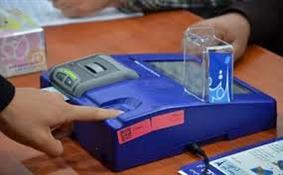ID :
491913
Sat, 05/12/2018 - 11:46
Auther :
Shortlink :
https://oananews.org//node/491913
The shortlink copeid
Iraqi Parliamentary Elections Begins Today To Choose 329 Representatives

Baghdad, Iraq (NINA) – The Parliamentary elections started today in Iraq on 12 May 2018, to The elections decide the 329 members of the Council of Representatives who will in turn elect the Iraqi President and Prime Minister.
A total of 204 parties have registered to contest the elections. A total of 27 coalitions were registered by the deadline, grouping 143 political parties.
The State of Law Coalition, which won the last election with 92 seats, will contest the election with two separate coalitions. Prime Minister Haider al-Abadi will contest the election as head of a coalition called "Victory" (a reference to the victory over Daesh) while his predecessor, Vice President Nouri al-Maliki will head the State of Law list.
Leading members from the Hashd al-Shaabi (Popular Mobilisation Forces), mainly Shiite Arab militias who fought alongside the Iraqi army to defeat Daesh from 2014 to 2017 have formed an alliance to contest the election. The Fatah Alliance includes the Badr Organisation, Asa'ib Ahl al-Haq, Kata'ib Hezbollah, Kata'ib al-Imam Ali, all key components of al-Hashd; the Badr Organisation, headed by Hadi Al-Amiri, which currently have 22 seats was previously part of the State of Law Coalition and announced their withdrawal in December 2017. Al-Fatah Alliance agreed that they will run jointly with al-Abadi's Nasr al-Iraq (Victory of Iraq) list, but the agreement fell apart after only 24 hours, reportedly over Abadi's conditions.
Ammar al-Hakim, the leader of the Citizen Alliance, the third largest bloc in parliament, announced in July 2017 that he was leaving the veteran Shiite Islamist party, the Islamic Supreme Council of Iraq – which he had led since the death of his father, Abdul Aziz al-Hakim – and forming a new "non-Islamic national movement" called the National Wisdom Movement (al-Hikma). All except 5 of the existing 29 MPs from the Citizens Alliance joined Al-Hikma.The remaining members of the Citizen Alliance joined the Fatah Alliance.
Muqtada al-Sadr announced a joint list with the Iraqi Communist Party, called the Alliance of Revolutionaries for Reform. This builds on previous collaboration with communists since 2016, when they have held joint protests in Baghdad against corruption and sectarianism in government.
Within the Kurdish parties, there had been significant changes since the previous election with the death of both Jalal Talabani, the long-time leader of the Patriotic Union of Kurdistan, the second largest party, and the opposition leader Nawshirwan Mustafa. In September 2017, Barham Salih, a former Prime Minister of Iraqi Kurdistan and deputy leader of the PUK, announced that he was leaving the party and forming a new opposition party—the Coalition for Democracy and Justice. The party was seen to have the potential to change the Kurdish political landscape. He said he hoped to gather all the other opposition parties, including Gorran to challenge the governing KDP–PUK alliance.The three parties formed a coalition called Nishtiman (Homeland) to run in the elections.The ruling KDP–PUK alliance have agreed to run again as a single list and all the Kurdish parties in Kirkuk have discussed running as a single list. However, the KDP announced they would boycott elections in Kirkuk and other areas they described as "under military occupation".
Within the Sunni Arab parties, the main Uniters for Reform Coalition (Muttahidoon), led by Osama al-Nujaifi, which won 23 seats in 2014, is running again, although the Iraqi Islamic Party, led by Speaker of Parliament Salim Jabouri, has left this coalition to join up with former Prime Minister Ayad Allawi's Al-Wataniya and Salah al-Mutlak's Al-Arabiya. The combined list will be called Al-Wataniya. Other parties as well have left Muttahidoon coalition including al-Hal Party and have formed various alliances in the name of the provinces they will run in, such as Salahuddin Our Identity in Saladuddin Governorate, and al-Anbar Our Identity in Al-Anbar Governorate and Baghdad Alliance in Baghdad.
Within the nonsectarian parties who aim to establish a civil state, the main alliance formed is the Civilized Alliance, led by Faiq Al Sheikh Ali, which currently has 4 seats. The alliance consists of four liberal, non-sectarian, national parties.
Of the 329 seats in the Iraqi parliament, 5 are reserved for the Assyrian minority. The five reserved seats are separated one for each governorate of: Baghdad, Duhok, Erbil, Kirkuk and Nineveh.[34] At the time of voting, only about 200,000 Assyrians remained in the country.
A member of the Board of Commissioners of the Electoral Commission, Mo'tamid Al-Moussawi announced that 250 international observers are present to monitor the elections protected the security services, and there are more than 50 thousand observers of political entities deployed in the electoral stations.
"Sometimes there is a breakdown in the voting devices and they are repaired by the maintenance teams deployed in all the polling stations in the country," he said in a press statement.
Al-Moussawi called on the media to be cautious in transmitting news indicating that the equipment is malfunctioning because the maintenance process of the devices does not exceed 10 minutes. "/ End





